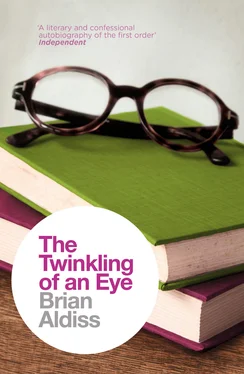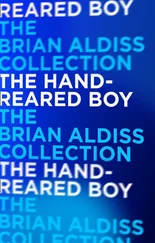Indeed, Aunt Nancy enjoys the good life. She is fun, and looks very pretty and stylish – perhaps the snappiest member of a family whose Achilles’ heel may be lack of style, at least until my sister Betty gets going. Nancy often trots up to London and buys herself a smart new dress, which we all admire. Her belief in jollity is perhaps a shade firmer than Allen’s. Of course, she is twenty years his junior.
Aunt Nancy becomes a favourite. She and uncle set up house in ‘Grendon’, which is north of Park Road, by the eponymous park. One spring, a robin nests by the latch of their side gate; the gate stands open for weeks, so that we don’t disturb it. Whenever I go to see Aunt Nancy, she puts her heels up on a chair, smokes and tells me jokes. Sometimes she tipples sherry. Later, fruit salad is served and I get all the halves of cherry.
Other important things happen while Dot and I are at Brinkdale that winter. We both get flu. Grandma worries. She remembers the great flu epidemic of 1919, when so many people who had survived the war died.
Brinkdale has its scary elements. On its upper landing, just where you have to turn the corner to go to the lavatory, hangs a sepia print of a Roman sentry in uniform, holding a spear, while behind him through a gloomy archway people are dying as flaming chunks fall from the smoky air. The sentry’s eyes roll upwards in a frightful way, as if spotting something disagreeable just behind me.
Grandma, to calm my fears, tells me that this is Poynter’s famous ‘Faithful Unto Death’. The doomy title does little to cheer me.
I must say something of that kindly and frail-looking person, my maternal grandmother.
Sarah Elizabeth Wilson is about fifty when Dot and her small boy stay with her in the winter of 1929. She is long past the climacteric when, in the eyes of small boys, people cease to be People and become a different species, the Old. It’s the difference between the frisky Atlantic and the Dead Sea.
Grandma wears elaborate widow’s weeds, and has never been out of them since her husband died. Her black dress is decorated with black beads and reaches to the floor. A frilled white collar fits tightly about her neck, much as Anne Boleyn might have worn when approaching the block.
Her face is almost fleshless, certainly colourless. Her grey hair is swept back and controlled by a velvet arrangement. She is a serious person. I am never able to warm to her. For this, I condemn myself. She is kind and patient. She will later play endless games of halma with me. And yet. Perhaps it’s the smell of lavender and mothballs …
Grandma has it good. For her, none of the struggle to live and keep heads above water which the rest of us experience. She has a cook and a maid and a mobcapped washerwoman with sharp elbows and a boot boy to help her. They all have their separate nooks in the rear of the house. Being a farmer’s daughter, Grandma is also an expert cook. Succulent home-cured hams, tremendous Christmas puddings and other delicacies hang in muslin like silkworm cocoons from the rafters of the cellar.
On her generous table are items of silver, cleaned once a week by the maid. There is a sugar sifter of particular fascination. She eats Grape Nuts for her breakfast, and takes the Daily Graphic , which she reads after breakfast. In the Graphic ’s pages, I follow the adventures of Pip, Squeak and Wilfred, and Squeak’s villainous uncle, Whifskoffski, who carries a round and smouldering bomb in his pocket, and is my favourite character. Whifskoffski is an old grey penguin and, though I know it not, a comment on the extraordinary events taking place in the Soviet Union.
When Grandma is ill, nurses march in, starched and proper, to sit by her bedside and command everyone with their Midland accents. She has a large family to worry about her every cough and sneeze. When she is well, there by her side is her faithful and jolly son Bert to escort her to the car, wrap her securely in a rug, and drive her about the countryside. She is never pushed from the stage of life by a younger generation. She remains always in control – though during World War II she once consents, but once only, to hide from German bombers under her solid kitchen table.
Dot and her son spend Christmas of 1929 at Brinkdale. All that remains of that occasion (but what a wonder that anything remains!) is a little Christmas tree in the back room, the drawing room, and the present of a drum. A bright tin drum, which the little drummer boy belabours exuberantly with two wooden drumsticks until he drives all concerned mad and is forbidden to play with it.
On one occasion Uncle Bert drives us to Milton Common, outside Peterborough. The uncles always tried to keep us amused. They throw away their dignity for the sake of a joke. No wonder we adore them – and behave ridiculously in return.
On Milton Common I find a small branch from which the bark has been stripped; it gleams white; I tell everyone I have found a mammoth tusk. Uncle Bert pretends to believe me.
We are there because the sun is about to go into total eclipse. We stand in the open, waiting. Gradually, a hole is bitten in the blazing buttock of the sun.
We drop our tusk.
The bite grows bigger. And now a mighty shadow gallops across the open ground towards us. We are swept up in it, as by a chilly tsunami. An eerie silence falls. Everyone is transfixed.
Then, in a minute, silver bursts forth on the right-hand side of the black disc. The sun is winning its struggle. Birds begin to sing again. Normality, swiftly returning, seems a disappointment. We walk back to Grandma Wilson, who has remained in the car, snug under her rug.
Eclipse or no eclipse, Grandma’s life is governed by pleasant routine. She walks down to the shops once a week, to Ross the Grocer and elsewhere, where she is received by men in clean white aprons, who listen reverently to her order as if to the Nunc Dimittis, and despatch her wants by errand boy that very afternoon.
Bill returns from South Africa with photographs of Table Mountain and is in better health.
Bill and Dot resume their life above the shop. Business occupies his mind. He must make it up to The Guv’ner for having been away. In the evenings, he and his wife sit by the coal fire talking business. Their faces are grave. They talk in the code of the shop.
Suppose we buy double K yards of it at U cis DX. With a mark up of B plus we can reckon on A cis BA, maybe, let’s see, A dat double C …
I hate this whispering, hate this code. It excludes me. Later, I take to Kafka like a duck to water. For the time being, I play with my Lotts’ Bricks and first Meccano set. I build a house for Uncle Bert to live in.
Bill has a repertoire of tricks with which to amuse me at table. He sticks his napkin ring into his eye socket for a monocle and adopts a highfalutin’ voice. When he jokes, I am happy and think how wonderful he is.
Shortly after Bill’s return, in the spring of 1930, I am standing in our living room in the sunshine. The door is open on to the flat roof, built over Father’s offices in the shop. It is announced on the wireless that a new planet has been discovered. The name of the astronomer involved is Clyde Tombaugh. The planet is to be called Pluto. It is the outermost planet of the solar system, and conditions there are bound to be pretty cold and dark.
I am thrilled. Though I would not have put it in such terms at the time, it is an extension of our imaginations. A whole extra new world that no one knew about. And how long had it been there …?
Not so very much later, I am reading books by. Sir James Jeans. Who, in 1931, could resist a book with the title The Stars in their Courses ? Jeans speaks of Pluto as being ‘so far out in space that its journey round the sun takes about 250 years to complete, and so far removed from the sun’s light and heat that in all probability not only all its water but also its atmosphere, if it has one, must be frozen solid.’
Читать дальше












